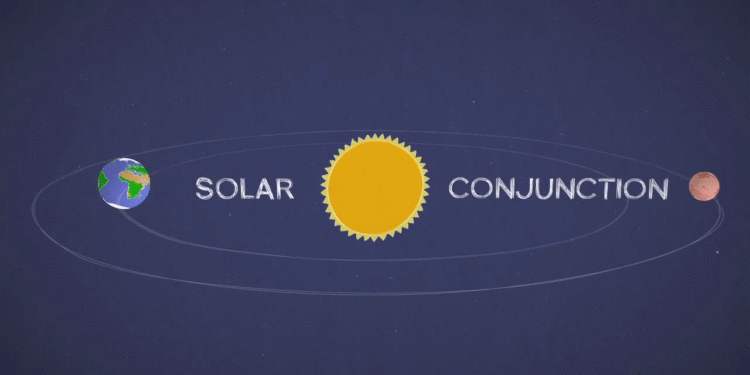
By Andrew Good | Phys.org
The daily chatter between antennas here on Earth and those on NASA spacecraft at Mars is about to get much quieter for a few weeks.
That's because Mars and Earth will be on opposite sides of the Sun, a period is known as Mars solar conjunction. The Sun expels hot, ionized gas from its corona, which extends far into space. During solar conjunction, this gas can interfere with radio signals when engineers try to communicate with spacecraft at Mars, corrupting commands and resulting in unexpected behavior from our deep space explorers.
To be safe, engineers hold off on sending commands when Mars disappears far enough behind the Sun's corona that there's increased risk of radio interference.
“It's that time again,” said Roy Gladden, manager of the Mars Relay Network at NASA's Jet Propulsion Laboratory in Pasadena, California. “Our engineers have been preparing our spacecraft for conjunction for months. They'll still be collecting science data at Mars, and some will attempt to send that data home. But we won't be commanding the spacecraft out of concern that they could act on a corrupted command.”
When is this taking place?
Solar conjunction occurs every two years. This time, the hold on issuing commands—called a “command moratorium”—will run from Aug. 28 to Sept. 7, 2019. Some missions will have stopped commanding their spacecraft earlier in preparation for the moratorium.
What happens to the spacecraft?
Although some instruments aboard spacecraft—especially cameras that generate large amounts of data—will be inactive, all of NASA's Mars spacecraft will continue their science; they'll just have much simpler “to-do” lists than they normally would carry out.
On the surface of Mars, the Curiosity rover will stop driving, while the InSight lander won't move its robotic arm. Above Mars, both the Odyssey orbiter and the Mars Reconnaissance Orbiter will continue collecting data from Curiosity and InSight for return to Earth. However, only Odyssey will attempt to relay that data to Earth before conjunction ends. Meantime, another orbiter, MAVEN, will continue to collect its own scientific data but won't support any relay operations during this time.
















